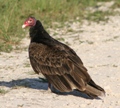Welcome to turkey hunting Guide
Carolina Hunting North Turkey Article
 . For a permanent link to this article, or to bookmark it for further reading, click here.
. For a permanent link to this article, or to bookmark it for further reading, click here.
You may also listen to this article by using the following controls.
from:Tips For Hunting turkey
Hunting turkey very well might be the most difficult of game hunting sports. These birds are keen at spotting hunters and they know how to get out of their own way when they need to. Between their eyesight and their hearing, it can be quite the challenge to actually bring one home.
Those who adore hunting turkey do so for a number of reasons. For many, it's more of the thrill of the chase than it is actually landing a gobbler. Patience and skill are the names of the game, which is why so many flock to the sport of hunting turkey.
There are some tips for hunting turkey that can help even the odds. Many successful turkey hunters try:
• Scouting out locations. As it is with real estate, so too is it with hunting turkey. It often all comes down to location, location, location. When a hunter has staked out a good spot where the birds will wander by during the morning or afternoon half the battle might already be won. A good location is one that provides cover from behind for the hunter and also gives good visibility. Blinds can create ideal makeshift spots, but so can trees and even large stumps. Finding perfect locations might require some advanced reconnaissance, but it can pay off.
• Using calls. Turkey calls work very well for luring the birds to a hunter's location. Using calls is an art form, however, and does take time to master. A variety of calls is often needed for the maximum effectiveness. Some hunters start out trying one. If it produces no results, they move on to another.
• Decoys can help. Decoys can help bring turkeys into a hunter's location very well. These little guys can be tricky to use, however. It is important to understand turkey hunting safety when using decoys. Many a hunter has mistaken a decoy for an actual gobbler, so accidental firing is a real concern here.
• Camouflage is key. In order to hunt turkeys successfully, a hunter must be able to hide from the birds. The right kind of camouflage can make a very big difference in the field. It's wise to camouflage any area of the body that is visible – from head to toe. Do not wear or use colors that match a gobbler's head, however.
Hunting turkey is a challenging game sport that requires a lot more skill than many might realize. It is not uncommon to hear stories of hunters who have gone out season after season with nary a sighting. There are ways to get an edge on the birds. When good tactics are brought into play, a winning advantage can be gained.









